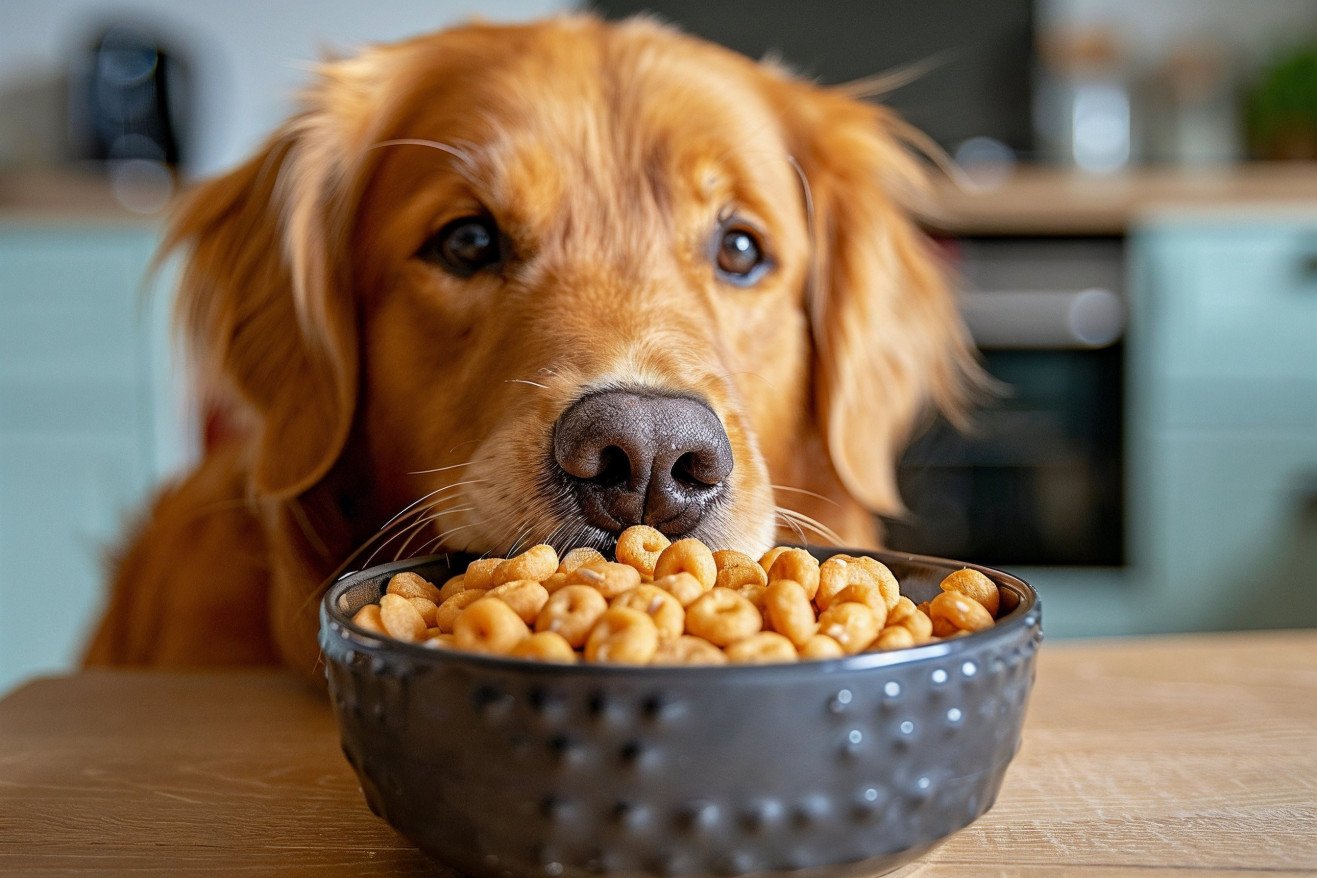Can Dogs Eat Cereal? Nutrition Facts for Humans' Favorite Breakfast
30 March 2024 • Updated 30 March 2024

If you've ever wanted to feed your dog your favorite breakfast cereal, you're not alone. While many cereals aren't poisonous to dogs, they're not the best option and should be fed to your pet in moderation, if at all. This is because many cereals are high in sugar, salt, and carbohydrates, which can cause obesity, dental problems, and digestive issues in dogs if they're consumed in large quantities.
We'll take a look at the potential downsides and upsides of letting your dog eat different kinds of cereals. By learning about the nutritional information and ingredients of popular cereals, you can decide whether you want to feed them to your dog in small amounts as a special treat, or avoid them altogether to help your dog stay as healthy and fit as possible.
Can dogs eat cereal?
Oatmeal: A Cereal That Can Be Good for Dogs
Oatmeal can absolutely be a healthy and nutritious cereal for dogs if it is consumed in moderation. As noted by Wild Earth, oatmeal is a good source of soluble fiber, which is important for maintaining a healthy digestive system, feeding the good bacteria in the gut, and controlling blood sugar levels. It also contains a variety of vitamins, minerals, and antioxidants such as vitamin A and B vitamins, as well as phosphorus, zinc, iron, calcium, copper, magnesium, and the omega-6 fatty acid linoleic acid, which is good for the skin.
To make sure that oatmeal is a healthy addition to your dog's diet, the AKC advises that you use plain, cooked oatmeal that has been made with water instead of milk, which can be hard for dogs to digest. You should also avoid instant and flavored oatmeals, which are highly processed. A good rule of thumb is to feed your dog 1 tablespoon of cooked oatmeal for every 20 pounds of body weight, and to limit oatmeal to 1-2 times a week to prevent problems like diarrhea and bloat. In addition, as The Farmer's Dog points out, oatmeal is high in fiber, so if you feed your dog too much, it can lead to an upset stomach.
Although oatmeal can be a nutritious and healthy snack or meal topper for dogs, it should not be used as a substitute for a well-balanced diet. If you prepare and serve it in the right portion sizes, oatmeal can be a healthy and occasional treat that provides your dog with the fiber, vitamins, and minerals they need to supplement their regular diet.
Decoding Cereal Ingredients: What's Safe and What's Not
Cereals that contain chocolate, raisins, or artificial sweeteners like xylitol are off-limits, as they can be poisonous to dogs. According to DogTime, these ingredients can be particularly harmful to dogs and may even lead to kidney failure or other health problems.
In addition, cereals that are high in sugar, salt, and artificial colors/dyes should be avoided, as they can be bad for dogs. According to Rover.com, these cereals can be unhealthy and potentially dangerous for dogs, leading to issues like obesity, dental problems, and more.
The best cereals for dogs are unsweetened, whole-grain cereals like Cheerios, Bran Flakes, Corn Flakes, and Rice Krispies, notes Dogster. When it comes to cereal treats, it's important to use them in moderation, and dog owners should always read the ingredients to make sure they don't include any harmful additives.
Cereals that contain nuts or dried fruits like raisins are also dangerous for dogs, according to Pure Pet Food. By learning about the cereal ingredients that are safe and those that are dangerous, dog owners can decide whether to occasionally give their dog a small amount of cereal as a treat or avoid it completely to ensure their pet stays as healthy as possible.
Potential Health Issues Associated With Overconsumption
Over time, overconsumption of cereal, especially those that are high in sugar and salt, can lead to obesity, dental problems, and gastrointestinal issues like diarrhea and vomiting, as Hepper points out. It can also increase the risk of pancreatitis, which can be life-threatening for dogs.
According to the American Kennel Club, cereals don't provide the complete and balanced nutrition that dogs need and should not be used to replace a dog's regular, high-quality diet. Even with the cereals that are safe for dogs to eat, it's important to make sure they don't eat too much of it, as overconsumption can lead to digestive problems and other issues.
It's important to talk to a vet, especially if a dog has other health issues or dietary needs, to make sure that eating cereal is safe and healthy for them. This will help ensure that eating cereal won't have any negative effects on a dog's health. It's important to remember that when it comes to giving dogs human food, including cereal, it's best to do so in moderation, even if the cereal is safe for dogs to eat.
Granola: Is It Safe or Dangerous for Dogs?
Granola can be given to dogs in small amounts, but it's not the best choice. According to Dogster, the main ingredients like oats and puffed rice are safe for dogs, but granola often includes ingredients that are poisonous to dogs, including raisins, grapes, macadamia nuts, xylitol, and chocolate. These ingredients can be very toxic and lead to kidney failure and other health problems.
In addition, granola is high in sugar, salt, and fat, which can lead to weight gain and digestive upset in dogs, says Hepper. It's also important to watch portion sizes, as Spoiled Hounds warns that granola should not exceed 10% of a dog's daily caloric intake.
Healthier alternatives to granola include homemade treats, freeze-dried meat treats, and store-bought dog treats. By learning about the potential dangers and benefits of giving granola to dogs, dog owners can decide whether to give their pet small amounts of the food as a treat or avoid it completely to help ensure their dog's overall well-being.
Nutritional Considerations: How to Choose the Right Cereal for Your Dog
While most commercial cereals are not nutritionally valuable for dogs, some whole-grain, low-sugar options can be safe and even healthy in small amounts when part of a well-balanced diet, according to Can Dogs Eat Cereal? Safe Choices for Pets. However, it’s important to note that dog owners should avoid cereals that contain toxic ingredients like chocolate, xylitol, raisins, and certain nuts, as these can be very harmful to dogs.
If you are going to give your dog cereal, it’s important to do so in moderation and consult a vet, as Purina explains that while dogs can digest cereals and grains, they should not be used to replace a complete and balanced diet. Plus, there are other dog treats that are healthier and more nutritious, like fruits.
According to a study published in PMC, whole grain cereals in dog food can provide essential nutrients, such as carbohydrates for energy, and fiber for digestive health. However, the same study found that 60% of the dog foods that were tested did not meet at least one of the nutritional guideline recommendations, which shows the importance of carefully choosing cereal-based options.
Conclusion: Finding the Right Mix of Treats and Nutrition for Your Dog
Although some grains can be healthy for dogs when consumed in moderation, they should not be used as a substitute for a well-rounded diet. Pet parents should be sure to check the ingredients in any dog food or treats they buy to make sure they don't include any harmful or toxic grains. Plus, it's important to make sure that dogs don't eat too many grains, even if they are safe, because they can still cause health problems.
It's always a good idea to talk to a vet, especially if your dog has any dietary restrictions or health issues. However, the choice to give your dog grains as a treat every once in a while will depend on your dog and their specific needs.


